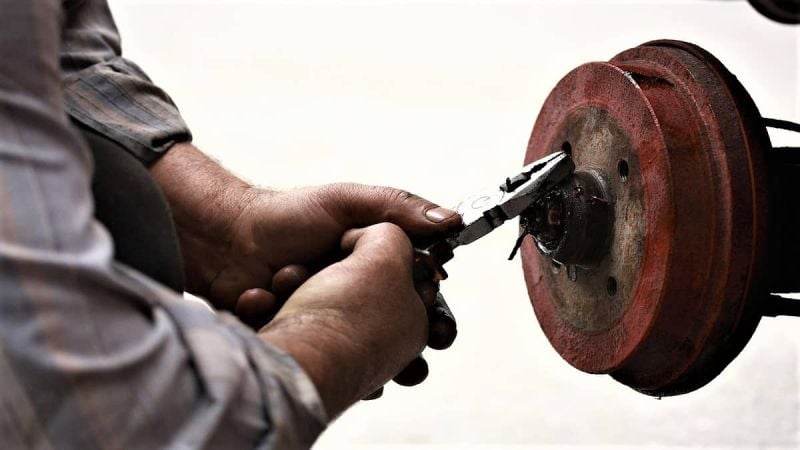Looking for Mr. Good Wrench
It is usually a good practice to seek help only from someone with a credentialed degree or certification as proof of knowledge and expertise in any given field. We do this with our physicians, our lawyers, and our tax accountants. And, when it comes to the repair and maintenance of our cars, we sometimes---but not always---look for a garage or service center with the Blue Gear ASE label on their mechanics’ sleeves.
Related article: Why Ford Customers Don’t Trust Ford Dealerships to Fix Their Cars
Here’s a quick video about what ASE is and how to recognize an ASE-certified mechanic.
Why ASE?
ASE Certification
ASE mechanic certification is not an easy training process. Mechanics with the certification either went through two years of on-the-job training or have completed one year of work experience along with a two-year degree, both of which required multiple comprehensive exams.
Due to that automotive technology changes relatively rapidly, certified ASE technicians have to recertify every 5 years to ensure that their knowledge and skills remain up to date to provide continual good service for customers.
As it turns out there is a range of different ASE qualifications that mechanics can pursue and achieve. For example, ASE certifications are categorized by a system/component-based alpha-numeric designation such as:
A1 – Engine Repair Certification
A2 – Automatic Transmission Certification
A3 – Manual Drivetrain and Axles Certification
A4 – Suspension and Steering Certification
A5 – Brakes Certification
A6 – Electrical Systems Certification
A7 – Heating and Air Conditioning Certification
A8 – Engine Performance Certification
And finally: the "Master Automotive Technician" designation whose extra training and skills has allowed him or her to earn the ASE Master Automotive Technician title---one of the most prestigious certifications in the automotive repair industry.
Related article: Trusted Mechanic Saves Toyota Owner Thousands from Repair Estimate Overcharge
Why This is Important to Know
The importance of knowing this is that rather than take your car for servicing based on a logo on the sleeve, it is important to ensure that the mechanic is skilled with the aforementioned listed system/components particular to your car’s repair needs.
In addition, one of the important considerations of using an ASE-certified mechanic is not only a measure of confidence that your car is in capable hands, but also that some warranty requirements may require all or some work done by an ASE Certified mechanic, or you may risk voiding your car’s warranty.
Unfortunately, however, not all ASE-certified mechanics are equal, or have actually followed through with continuing education and recertification---but still wear the Blue Gear logo on their sleeve.
Case in Point
The following is a recent video from The Car Wizard who demonstrates what happened to one customer who brought in a car that had been repaired (and charged) three times for repairs that failed to fix the customer’s car problems. Furthermore, it was a garage with reputedly ASE-Certified mechanics. Worse yet, there appears to be deliberate fraud involved rather than just incompetence.
Here is the video below in its entirety that is a good lesson in one of the biggest red flags car repair customers ignore until it is too late:
Huge repair bill, unneeded parts & not fixed! CAR WIZARD finds the real problem on '01 Jaguar S-Type
And finally…
The take home messages is the ol’ “Fool me once shame on you, fool me twice shame on me” adage. Whenever you have paid any garage for work to be done, but it has not fixed the problem the first time you brought your car in for repair, rather than risk repeat a non-repair incident that is going to drive up your repair bill further, it is best to look for a second opinion about your car and what is going on---whether or not the mechanic is ASE-certified or not.
Furthermore, while ASE certification is a good first step towards finding a capable mechanic, be sure to check what level of certification he or she possess to ensure that your car’s problem is being addressed by the correct mechanic.
As an added measure when searching for Mr. Good Wrench, one of the better ways is never to seek out someone right off with a complete list of car problems to take care of; rather, choose one item and see how it works out for you and base your judgement(s) on what you find. And in almost all cases, seek at least one additional opinion/estimate to not only get an idea of what the going rate for the repair is, but to learn why choosing the cheapest estimate is not always the best route to go.
Related article: Toyota Maintenance Non-OEM Parts Warning
For additional articles related to car repair, here are two very informative articles every car titled “Avoid Voiding Your Toyota Warranty with This Important Advice on How Warranties Work and Don’t Work” and “Consumer Reports Car Experts on Finding a Trustworthy Mechanic.”
COMING UP NEXT: Consumer Reports Lists the Most Discounted New Cars to Buy Right Now
Timothy Boyer is a Torque News automotive reporter based in Cincinnati. Experienced with early car restorations, he regularly restores older vehicles with engine modifications for improved performance. Follow Tim on Twitter at @TimBoyerWrites for daily new and used vehicle news.
Image courtesy of Pixabay












